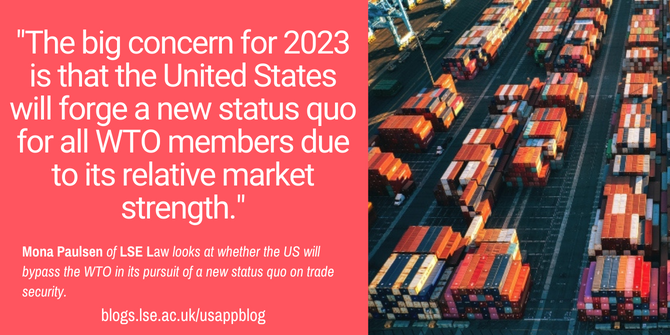 In mid-December 2022, a World Trade Organization (WTO) dispute settlement panel ruled that tariffs on steel and aluminium products introduced by the Trump administration were in breach of the trading system’s rules. The US has dismissed these findings. Mona Paulsen looks at the US’ efforts to bypass the WTO and what that means for EU and UK trade policy.
In mid-December 2022, a World Trade Organization (WTO) dispute settlement panel ruled that tariffs on steel and aluminium products introduced by the Trump administration were in breach of the trading system’s rules. The US has dismissed these findings. Mona Paulsen looks at the US’ efforts to bypass the WTO and what that means for EU and UK trade policy.
Strategic industries, warming global temperatures, and pandemics have altered the prevailing wisdom that international rules foster economic growth. Leading economies assert trade policy offensively, seeking to eliminate or dominate critical supply nodes in the interconnected global economy.
What is the World Trade Organization’s (WTO) role in facing these persistent crises? The worst outcome will be if members stop using the WTO – the international organization dealing with the trading rules between countries – altogether, bypassing it through unilateral measures. For example, the United States is choosing to ameliorate trade insecurities with select ‘like-minded allies’ through diplomatic talks outside of the WTO talks or by invoking domestic laws to cause trade pain on allied trading partners on the grounds of national security.
A new status quo for the WTO in 2023?
The big concern for 2023 is that the United States will forge a new status quo for all WTO members due to its relative market strength. A recent WTO panel was not persuaded that the United States’ tariffs on steel and aluminium products were consistent with the WTO rules. If they had been consistent, the United States could assert that necessary actions were taken to protect security interests and avoid having to address remedies under the trade rules (eight members brought disputes to the WTO). The panel did not find that the United States’ security concerns were illegitimate. Instead, it found that the US measures were inconsistent with the rules. This means the United States must either stop imposing tariffs (unlikely) or find a mutual solution. If not, the impacted members may suspend concessions or other obligations to the United States to offset the harm caused by the tariffs.

Photo by Venti Views on Unsplash
This becomes more complicated if the United States appeals the report when there is no higher body to appeal to (the Appellate Body, the WTO’s ‘Supreme Court’, has been ineffective since the Trump administration blocked new appointments) as this means the complaining member would have to act unilaterally to retaliate against the United States.
The United States Trade Representative’s response to dismiss the panel’s findings was expected. We may see China use the WTO to have panels evaluate US export controls as WTO-inconsistent. Will the United States continue to engage with other governments and reference the language of the WTO? Will it speak to multilateral coordination and non-discrimination between foreign and domestic goods? Will it be transparent in its practices and accept peer review of its trade policies?
What a disengaged US means for global trade
How the United States continues to engage with the WTO members and the WTO functions will matter in 2023. US practices and policies may stretch when, how, and why other governments accept national security as a reason to restrict trade (either in copying this strategy or permitting the United States to do so). However, crucially, this will not occur through established legislative processes to change the existing trade-offs between security and efficiency within the WTO rules architecture. Without deliberation, other WTO members invested in an open, global economy are either side-lined, left to pick sides, or forced to prioritise self-sufficiency.
Moving forward, the EU and UK will need to determine what it means to diversify supply chains, particularly considering energy and climate security, while contending with a trading partner that shows no hesitation to ignore rules that do not serve its domestic agenda. The UK may find itself stuck in an even thornier place, as the EU and the US ratchet subsidies to assure dominance in key climate mitigation technologies and semiconductors. The UK needs to consider its future moves carefully. Its audience is not just the EU and the US, but the rest of the world.
- Please read our comments policy before commenting.
- Note: This article gives the views of the author, and not the position of USAPP – American Politics and Policy, nor the London School of Economics.
- Shortened URL for this post: https://bit.ly/3FRVL4N






